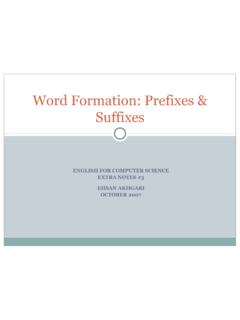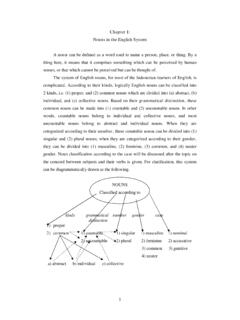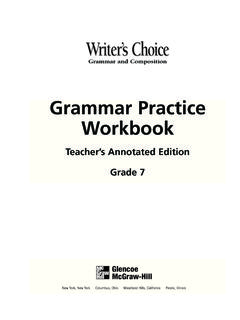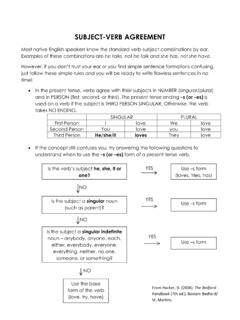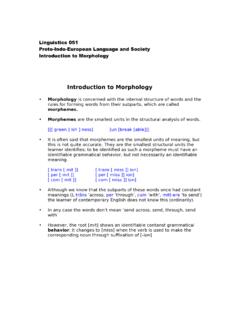Transcription of Practice Makes Perfect English Vocabulary ... - SarkariHelp
1 Copyright 2012 by McGraw-Hill Education. All rights reserved. Except as permitted under the UnitedStates Copyright Act of 1976, no part of this publication may be reproduced or distributed in any form orby any means, or stored in a database or retrieval system, without the prior written permission of : 978-0-07-176304-2 MHID: 0-07-176304-XThe material in this eBook also appears in the print version of this title: ISBN: 978-0-07-176303-5,MHID: conversion by codeMantraVersion trademarks are trademarks of their respective owners. Rather than put a trademark symbol after everyoccurrence of a trademarked name, we use names in an editorial fashion only, and to the benefit of thetrademark owner, with no intention of infringement of the trademark. Where such designations appear inthis book, they have been printed with initial Education eBooks are available at special quantity discounts to use as premiums and salespromotions, or for use in corporate training programs.
2 To contact a representative please visit the ContactUs pages at : McGraw-Hill, the McGraw-Hill Education logo, Practice Makes Perfect , and related tradedress are trademarks or registered trademarks of McGraw-Hill Education and/or its affiliates in theUnited States and other countries and may not be used without written permission. All other trademarksare the property of their respective owners. McGraw-Hill Education is not associated with any product orvendor mentioned in this OF USEThis is a copyrighted work and McGraw-Hill Education and its licensors reserve all rights in and to thework. Use of this work is subject to these terms. Except as permitted under the Copyright Act of 1976 andthe right to store and retrieve one copy of the work, you may not decompile, disassemble, reverseengineer, reproduce, modify, create derivative works based upon, transmit, distribute, disseminate, sell,publish or sublicense the work or any part of it without McGraw-Hill Education s prior consent.
3 You mayuse the work for your own noncommercial and personal use; any other use of the work is strictlyprohibited. Your right to use the work may be terminated if you fail to comply with these WORK IS PROVIDED AS IS. McGRAW-HILL EDUCATION AND ITS LICENSORS MAKENO GUARANTEES OR WARRANTIES AS TO THE ACCURACY, ADEQUACY ORCOMPLETENESS OF OR RESULTS TO BE OBTAINED FROM USING THE WORK, INCLUDINGANY INFORMATION THAT CAN BE ACCESSED THROUGH THE WORK VIA HYPERLINK OROTHERWISE, AND EXPRESSLY DISCLAIM ANY WARRANTY, EXPRESS OR IMPLIED,INCLUDING BUT NOT LIMITED TO IMPLIED WARRANTIES OF MERCHANTABILITY ORFITNESS FOR A PARTICULAR PURPOSE. McGraw-Hill Education and its licensors do not warrant orguarantee that the functions contained in the work will meet your requirements or that its operation will beuninterrupted or error free. Neither McGraw-Hill Education nor its licensors shall be liable to you oranyone else for any inaccuracy, error or omission, regardless of cause, in the work or for any damagesresulting therefrom.
4 McGraw-Hill Education has no responsibility for the content of any informationaccessed through the work. Under no circumstances shall McGraw-Hill Education and/or its licensors beliable for any indirect, incidental, special, punitive, consequential or similar damages that result from theuse of or inability to use the work, even if any of them has been advised of the possibility of suchdamages. This limitation of liability shall apply to any claim or cause whatsoever whether such claim orcause arises in contract, tort or to Use This BookPART I NounsUnit 1 People and PlacesWords for PeopleWords for PlacesUnit 2 Singular, Plural, and Noncount NounsUsing Singular NounsUsing Plural NounsUsing Noncount NounsUsing Articles with Singular, Plural, and Noncount NounsUsing Demonstrative Pronouns with Singular, Plural, and Noncount NounsUnit 3 Proper NounsUnit 4 Possessive Nouns and PronounsPossessive NounsPossessive PronounsUnit 5 Review of Singular, Plural.
5 And Noncount NounsUnit 6 Verbs Used as NounsUnit 7 More Specific NounsWords for PeopleWords for the ArtsWords for PlacesWords for ThingsWords for EventsPART II AdjectivesUnit 8 Making DescriptionsAdjectives That Describe PeopleAdjectives That Describe a Person s ConditionAdjectives That Describe ObjectsAdjectives That Describe PlacesAdjectives That Describe the WeatherUnit 9 Comparisons and SuperlativesMaking an Adjective Stronger or WeakerMaking Comparisons with AdjectivesExpressing SuperlativesUnit 10 Verbs and Nouns Used as AdjectivesVerbs Used as AdjectivesNouns Used as AdjectivesUnit 11 Adjective OrderPART III VerbsUnit 12 The Verb BeThe Present Tense of BeAsking Questions with BeMaking Be NegativeThe Past Tense of BeUnit 13 Non To Be VerbsRegular Present Tense Forms of Verbs Other than BeRegular Past Tense FormsVerbs That Describe Usual ActivitiesIrregular Past Tense FormsVerbs Used for Household ActivitiesVerbs Used in a ClassroomMaking Verbs NegativeActivities That Are Often Performed in an OfficeAsking QuestionsVerbs Used for ShoppingVerbs Used in a BankUsing the Present Progressive TenseVerbs Used for Outdoor ActivitiesVerbs Used for Activities in Public PlacesUsing the Present Perfect TenseVerbs Used for Leisure ActivitiesVerbs Used for CookingGiving DirectionsPART IV AdverbsUnit 14 Adverbs of Place, Time, and FrequencyAdverbs of PlaceAdverbs of TimeAdverbs of FrequencyUnit 15 Adverbs of MannerForming Adverbs from AdjectivesComparing AdverbsUnit 16 Adverbs That ModifyAdverbs That Modify VerbsAdverbs That Modify Adjectives and Other AdverbsPART V English in the Twenty-First Century.
6 TechnologyUnit 17 General Vocabulary for TechnologyNounsAdjectivesVerbsUnit 18 Contacting Other People: The Technology of CommunicationsThe TelephoneThe Fax MachineThe Internet for CommunicatingUnit 19 Getting Information: The MediaNewspapers and MagazinesTelevision for Getting InformationThe Internet for Getting InformationUnit 20 EntertainmentTelevision/TV for EntertainmentAudio DevicesReading Devices/Electronic Books/E-ReadersCamerasUnit 21 Technology in Other PlacesFor TravelingFor BankingFor ShoppingEverywhere ElseAnswer KeyIntroductionIt is not easy to know how to start learning new words in a language that is not your native one. Mostsecond-language learners depend on a favorite dictionary to get a quick translation of an unknown word;however, dictionaries are full of words that you may never need to use, or even to understand.
7 How doyou know which words to learn first?One of the purposes of this book is to acquaint you with the English words that are most frequently used inthe United States today the words that people use every day with their family, friends, coworkers, andother people in the community in general. Presented here is a basic Vocabulary of more than fifteenhundred words that have been carefully chosen because of their frequent appearance and usefulness indaily life. Once you have learned these words and mastered the structures in which they are used, youwill be well equipped to add new words to this list, and you ll gradually continue to increase yourworking words of a language can be divided into two groups: content words and function words. Contentwords in English are either nouns words that name people, places, things, or abstracts; adjectives words that describe nouns; verbs words that describe the actions of nouns; or adverbs words thatdescribe how an action is performed.
8 Function words are those that form a structure that enables us to putthe content words together to make sense. English function words include, for example, words such as a,the, of, for, and and words that would be difficult to draw a picture of or to define in a word or types of words are extremely important for communication in any second purpose of this book is to provide Practice in using content words within the framework ofthe function words that go with them. By practicing these two types of words together you will be not onlylearning new Vocabulary but also using it correctly, enabling you to form meaningful sentences with avariety of individual are four sections in the book: Part I: Nouns, Part II: Adjectives, Part III: Verbs, and Part IV:Adverbs. Each of these parts contains a number of units, and each unit consists of special Vocabulary for acertain topic and extensive exercises to Practice to Use This BookThe best way to learn new Vocabulary is to use it, both in speech and in writing.
9 The exercises in thisbook are designed to give you that Practice by encouraging you to write down exactly what you would sayin the context provided. The repetition of words and structures in various types of exercises will help youremember the words and make them yours to use in real are suggestions to help you get the most out of this book:1. Get a good dictionary, either bilingual or English only, to use as suggested Copy on a separate sheet of paper the lists of words presented in each You will already know some of the words. Write a check by each one if you are certain of Look up in your dictionary the words that you do not know or are not sure of, and write a word inyour language or a definition in English next to it on your Do the written exercises for the entire In the exercises that ask you to write personal sentences, try to use words that are new to you.
10 Ofcourse, if the new words do not fit, use words that you already Compare your answers with those in the Answer Key at the back of the book. For the exercises thatrequire personal answers, you may wish to ask a native speaker friend to read your answers to see ifthey are Go back to your original list, cover up the translations or definitions that you first wrote, and see ifyou now know all the new Try writing more sentences, using the same patterns used in the exercises, to further Practice thewords that you haven t completely mastered so Keep practicing!PART INOUNSN ouns are the words we use to name all the things we know about, have, see, hear, taste, smell, or includes words for people, such as man, teacher, and friend. It includes words for places, such ascity, kitchen, and street. It includes words for things, such as ball, tree, and computer.

